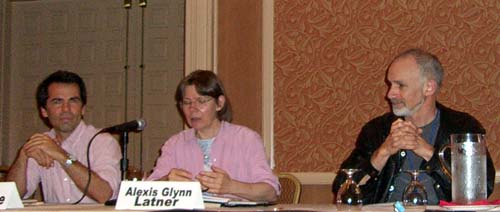Peak oil or sex robots?
John Moore asks the audience which of the two likely realities of the 21st century they would like to talk about: peak oil or sex robots? The audience goes for the less disturbing topic, sex robots, and the positive aspect of it: the demand for them will drive robotics and a lot of other scientific disciplines. After all, sex has long been driving technological change: in the last century porn created enough demand for photographic chemicals so they started to be produced in factories. Before that, you had to mix them yourself. And blue movies provided a critical mass for VCRs. And, of course, porn drove the rise of the internet. Sean McMullen is convinced robots and virtual reality will never replace live interaction with other human beings because they won't provide the same richness of experience. "Look at what's on a video game. It's nothing like reality. People who put those games together, they are totally out of sync with reality. Real environment, if you're over here, plug into the virtual reality thing; on the other hand, there is a party next door, and there are nice people; You're not guaranteed to score, but those nice people may change your life. So I would take the real life adventure every time."Relationship of real and virtual words is not as cut-and-dried
People from the audience argue that the relationship of real and virtual words is not as cut-and-dried. One audience member says that the virtual community of his MMPG is having a real life barbeque tomorrow. The novel form of interaction is mixing the two worlds. He plays a female character, even though the players know he's a guy, and it has been a wonderful experience. He bonded over it with his daughter. It's been a liberating concept. He's now one of the girls. They invite him to those things and just have the girl chatter. John Moore. When you're watching Motorcross on television versus real life, virtual reality improves upon reality. Things that are tedious and not interesting in real life can be made more interesting in virtual reality. Like motorcycle jumps when shown with a camera. A discussion ensues whether we will see radical, drastic technological changes, or will technical advances be more of an incremental kind, like "progressing" from Word 2000 to Word 2003. Some of the stranger ideas, tossed about by Alexis Glynn Latner, was that maybe 9/11 scenario was inspired by the violent special effects in movies and video games. "Could 9/11 have hapepend in a world where there were no special effects in the movies?" she asks. She thinks the terrorist used this particular scenario, crashing planes into buildings, because it provided very violent visuals, the kind they must have seen in the movies and video games.
Left to right: John Moore, Alexis Glynn Latner and Sean McMullen. Here are more posts from ArmadilloCon 2005.
No comments:
Post a Comment